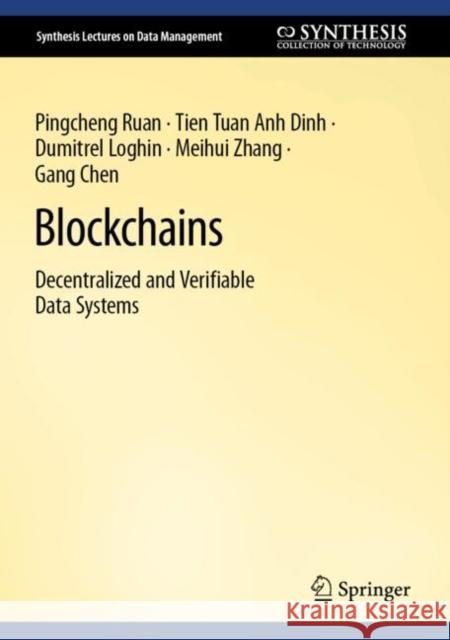Blockchains: Decentralized and Verifiable Data Systems » książka
Blockchains: Decentralized and Verifiable Data Systems
ISBN-13: 9783031139789 / Angielski / Twarda / 2022 / 118 str.
Blockchains: Decentralized and Verifiable Data Systems
ISBN-13: 9783031139789 / Angielski / Twarda / 2022 / 118 str.
(netto: 230,54 VAT: 5%)
Najniższa cena z 30 dni: 231,29
ok. 16-18 dni roboczych.
Darmowa dostawa!
This book takes readers through the sensational history of blockchains and their potential to revolutionize database systems of the future. In order to demystify blockchains, the book capitalizes on decades of research and field testing of existing database and distributed systems and applies these familiar concepts to the novel blockchain system. It then utilizes this framework to explore the essential block platform underpinning blockchains, which is often misunderstood as a specific attribute of cryptocurrencies rather than the core of the decentralized system independent of application. The book explores the nature of these decentralized systems, which have no single owner and build robustness through a multitude of stakeholder contributions. In this way, blockchains can build trust into existing systems and thus present attractive solutions for various domains across both academia and industry. Despite this, high-impact and real-world applications of blockchain have yet to be realized outside of cryptocurrencies like Bitcoin. The book establishes how this new data system, if properly applied, can disrupt the sector in much the same way databases did so many years ago. The book explores the fundamental technical limitations that may be preventing blockchain from realizing this potential and how to overcome or mitigate them. Readers who are completely new to blockchains will find this book to be a comprehensive survey of the state of the art in blockchain technology. Readers with some experience of blockchains, for example through developing cryptocurrencies, will likely find the book’s database perspective enlightening. Finally, researchers already working with blockchain will learn to identify existing gaps in the design space and explore potential solutions for creating the next generation of blockchain systems.
This book takes readers through the sensational history of blockchains and their potential to revolutionize database systems of the future. In order to demystify blockchains, the book capitalizes on decades of research and field testing of existing database and distributed systems and applies these familiar concepts to the novel blockchain system. It then utilizes this framework to explore the essential block platform underpinning blockchains, which is often misunderstood as a specific attribute of cryptocurrencies rather than the core of the decentralized system independent of application. The book explores the nature of these decentralized systems, which have no single owner and build robustness through a multitude of stakeholder contributions. In this way, blockchains can build trust into existing systems and thus present attractive solutions for various domains across both academia and industry. Despite this, high-impact and real-world applications of blockchain have yet to be realized outside of cryptocurrencies like Bitcoin. The book establishes how this new data system, if properly applied, can disrupt the sector in much the same way databases did so many years ago. The book explores the fundamental technical limitations that may be preventing blockchain from realizing this potential and how to overcome or mitigate them. Readers who are completely new to blockchains will find this book to be a comprehensive survey of the state of the art in blockchain technology. Readers with some experience of blockchains, for example through developing cryptocurrencies, will likely find the book’s database perspective enlightening. Finally, researchers already working with blockchain will learn to identify existing gaps in the design space and explore potential solutions for creating the next generation of blockchain systems.











